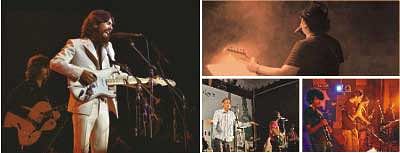Bangladesh <i>from</i> A Different Perspective

Rock artistes who, personally or through group work, showcased their empathy and innermost feelings through producing songs titled “Bangladeshâ€. Photo Source: Facebook
In August 1971, a friend from a far away land revealed his empathy for the people of the then war-ridden Bangladesh. George Harrison, the former Beatle, responded to one of his friends [Pandit Ravi Shankar] and sang “My friend came to me, with sadness in his eyes/He told me that he wanted help, before his country dies…Bangladesh.”
Years have gone by since the rendition of that song at the Madison Square Garden in New York; the country has not died but it's not been changed much either.
Everyone has his or her own way to love and respect the motherland, to pay tribute to her. Like Harrison, some of the country's well known musicians have shown their respect and paid tribute through songs over the years. Among them are some rock artistes who, personally or through group work, showcased their empathy, agony and frustration at unfulfilled dreams. They have displayed their innermost feelings through the production of songs titled “Bangladesh”.
With his personal experience of the War as a Freedom Fighter, pop guru Azam Khan saw his hopes and dreams soon to be shattered as he sang “Rail-line-er oi bostite, jonme chhilo ekti chhele/Ma tar kande, chheleti mara gechhe…Hai re hai Bangladesh”. After four decades, Khan's “Bangladesh” still remains relevant. The song is contemporary for that reason and popular among the younger generation.
Empathy and the failure to fulfill the promises of the Liberation War are also the core aspects of the Renaissance number “Hey Bangladesh”. The song that was released in the band's tribute album. “Ekatturer Renaissance” is a great musical work with remarkable groove and dominant sounds of the saxophone. The lyrics are undoubtedly conscience-raising: “Ekatture je bodhu hariyechhilo taar shami ke/ shey ekhon briddha hoyechhe/ shamir swapno taar hariye gechhey/ shey bujhte pare ebar chheleke juddhe pathanor shomoy hoyechhe”.
Perhaps Feedback's “Bangladesh” is not as political as the Renaissance number, yet Maqsood recounts and cherishes the motherland in the song. He recalls the country's achievements, may be little but not least. The song was released in the album “Nishiddo”.
Borrowing a line from the National Anthem “Amar Shonar Bangla ami tomay bhalobashi”, James [of Nagar Baul] sings his “Bangladesh” in a more positive manner. He sings paeans to the achievements, the great personalities as well as the natural beauty of the country. This positive outlook is also apparent in Ayub Bachchu's “Bangladesh”. Like James, he also recounts the achievements by similes. Both the songs were released as solo works of the artistes.
A group of New York-based young Bangladeshis also felt deeply for the country and sang a beautiful song, “Bangladesh”, in their debut album “Light Years Ahead”. Stoic Bliss, the hip-hop band, produced the song with mixed lyrics of Bangla and English. Referring to the dark chapters of history such as the murder of Bangabandhu at the hands of his own countrymen and the rise of the anti-Liberation War forces, the song is a mature work in the sense of generating political awareness among young expatriates.
Alternative rock band Artcell paid its tribute “Bangladesh, Smriti Ebong Amra” in the mixed album “Agontuk 3”. With heavy beats and sound, the song recounts historic events such as the Liberation War and the Language Movement as the backdrop.
Shironamhin's tribute number “Bangladesh” in the album “Bondho Janala” is one of the most artistic approaches. While listening to the song, one must conjure up a lot of images as it depicts the country's natural beauty in an abstract way. The lyrics: “Jokhon ek chokhe ghum ghum, ek chokhe neel raat amaye bhabiye jaye jokhon/…ek prante shobuj ek prante lal, amar Bangladesh”.

 For all latest news, follow The Daily Star's Google News channel.
For all latest news, follow The Daily Star's Google News channel. 



Comments